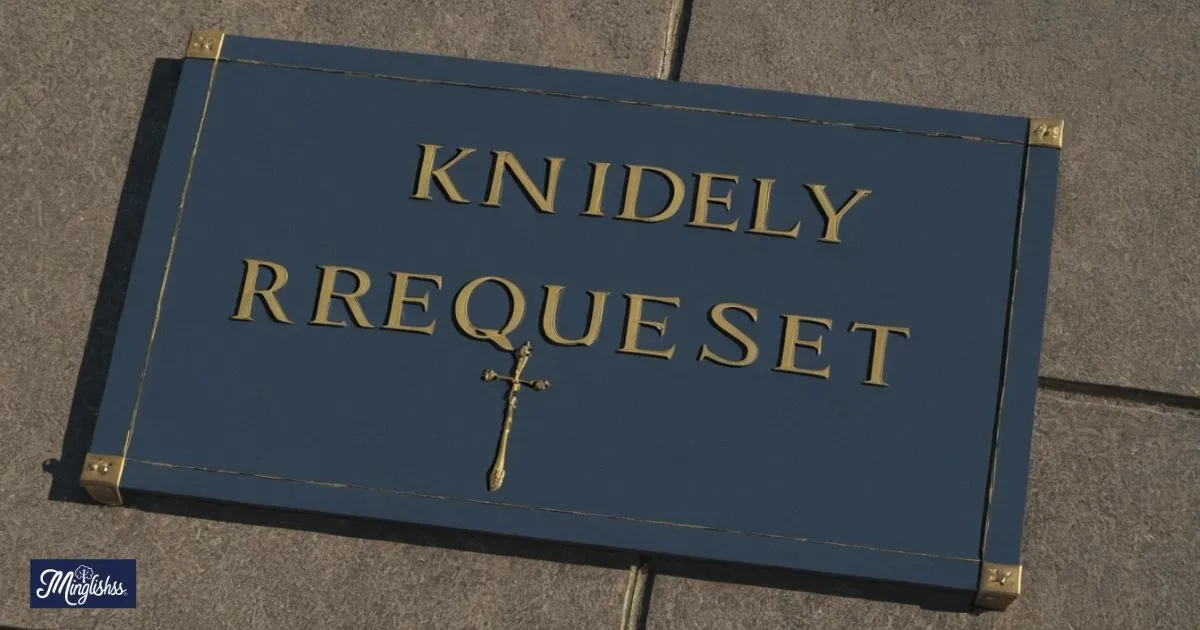“Sometimes, the way you ask matters more than what you ask for.”
In both formal and informal communication, it’s often necessary to ask for something politely. While “kindly request” is a widely accepted phrase, there are plenty of alternatives that can make your message sound fresh, professional, or even more approachable. By using varied expressions, you can convey the same sentiment with a unique flair each time.
From workplace emails to personal interactions, these alternatives to “kindly request” will help you communicate effectively while maintaining a courteous tone. Let’s explore 35 ways to express the same idea, each with its own nuance and charm.
1. Would You Please
Scenario: Lily emails her manager: “Would you please review my report by Friday?”
Subject Explanation: This phrase softens the request while maintaining politeness.
Additional Tip: Best for formal communication when you need cooperation without sounding demanding.
2. I Would Appreciate It If
Scenario: Tom says to a colleague, “I would appreciate it if you could share your feedback by tomorrow.”
Subject Explanation: This phrase conveys gratitude alongside your request.
Additional Tip: Perfect for situations where gratitude is implied in advance.
3. Could You Kindly
Scenario: Emma writes, “Could you kindly provide me with the latest project updates?”
Subject Explanation: A classic phrase that is polite and slightly formal.
Additional Tip: Avoid overusing “kindly” to keep your tone natural.
4. I’d Be Grateful If
Scenario: During a team meeting, Alex says, “I’d be grateful if you could handle this task today.”
Subject Explanation: Adds a warm touch to your request, implying personal appreciation.
Additional Tip: Use in one-on-one settings to sound genuine.
5. May I Ask You To
Scenario: Sarah emails her supervisor: “May I ask you to review the budget proposal?”
Subject Explanation: This phrase gives the listener a sense of choice, making the request sound considerate.
Additional Tip: Great for hierarchical settings where respect is key.
6. Please Be So Kind As To

Scenario: James writes, “Please be so kind as to forward this email to the finance team.”
Subject Explanation: A formal and traditional way to make a courteous request.
Additional Tip: Reserve for highly formal or ceremonial communications.
7. I Humbly Ask
Scenario: In a speech, Marie says, “I humbly ask for your support in this initiative.”
Subject Explanation: Adds humility to your request, making it more impactful.
Additional Tip: Suitable for emotional appeals or public speaking contexts.
8. If It’s Not Too Much Trouble
Scenario: Ben asks his coworker, “If it’s not too much trouble, could you cover my shift?”
Subject Explanation: A casual, empathetic way to phrase a request.
Additional Tip: Best for informal or friendly settings.
9. Would You Be Able To
Scenario: Carla writes to her supplier: “Would you be able to expedite the delivery?”
Subject Explanation: Polite and neutral, this phrase is useful for professional contexts.
Additional Tip: Use when inquiring about someone’s capability to help.
10. I Would Like To Request
Scenario: During an interview, David says, “I would like to request a clarification on this point.”
Subject Explanation: Straightforward and professional, this phrase is ideal for formal conversations.
Additional Tip: Works well when making official inquiries.
11. Might I Ask
Scenario: Ella asks her professor, “Might I ask for an extension on this project?”
Subject Explanation: Adds a touch of politeness with a formal tone.
Additional Tip: Best for academic or hierarchical settings.
12. Do You Mind If I Ask
Scenario: Paul says to a colleague, “Do you mind if I ask for your assistance with this task?”
Subject Explanation: Casual and considerate, this phrase opens the door for collaboration.
Additional Tip: Use when the request could require extra effort.
13. It Would Be Great If
Scenario: Lucas mentions in a meeting, “It would be great if everyone could submit their reports by 5 PM.”
Subject Explanation: Makes the request sound like a suggestion while maintaining authority.
Additional Tip: Effective for group communications.
14. Your Help Would Be Appreciated
Scenario: Olivia writes to her team, “Your help would be appreciated in organizing the event.”
Subject Explanation: Encourages participation by showing respect for others’ contributions.
Additional Tip: Use for collaborative settings to build goodwill.
Other Ways to Say “Looking Forward to Your Feedback”
15. I Am Reaching Out To Ask
Scenario: Noah emails a potential partner: “I am reaching out to ask if you’d be interested in collaborating.”
Subject Explanation: A modern and polished way to make a request.
Additional Tip: Ideal for initiating professional connections.
16. I Kindly Seek
Scenario: Hannah emails HR: “I kindly seek clarification on the new policy.”
Subject Explanation: A concise and polite way to express a formal request.
Additional Tip: Best suited for formal business correspondence.
17. If You Could Be So Generous
Scenario: Liam says to a friend, “If you could be so generous as to lend me your notes, I’d be grateful.”
Subject Explanation: Implies the listener is doing a favor, making the request sound humble.
Additional Tip: Works well for personal or casual requests.
18. Allow Me to Request
Scenario: Sophie says during a presentation, “Allow me to request your attention for this critical point.”
Subject Explanation: Formal and polite, this is great for speeches or public addresses.
Additional Tip: Use sparingly to maintain its impact.
19. Would It Be Possible For You To
Scenario: Emma asks her landlord, “Would it be possible for you to send the updated lease agreement?”
Subject Explanation: Makes the request sound feasible and reasonable.
Additional Tip: Effective when timing or logistics are involved.
20. I Gently Ask
Scenario: Sophie tells her colleague, “I gently ask you to double-check the figures before submission.”
Subject Explanation: This phrase adds a soft, non-demanding tone to your request.
Additional Tip: Suitable for sensitive topics where you want to avoid appearing too assertive.
21. May I Kindly Suggest
Scenario: Brian emails a teammate, “May I kindly suggest reviewing the document once more?”
Subject Explanation: A polite and indirect way to request action while offering a suggestion.
Additional Tip: Use this when requesting corrections or edits tactfully.
22. If You Don’t Mind
Scenario: Clara asks her friend, “If you don’t mind, could you share your recipe with me?”
Subject Explanation: A casual phrase that respects the listener’s time and boundaries.
Additional Tip: Best for informal requests with friends or family.
23. Could I Trouble You To
Scenario: Mark asks his neighbor, “Could I trouble you to water my plants while I’m away?”
Subject Explanation: Shows consideration by acknowledging the effort your request might involve.
Additional Tip: Use sparingly to avoid sounding overly apologetic.
24. It Would Mean a Lot If
Scenario: Olivia says to her classmate, “It would mean a lot if you could share your notes from the lecture.”
Subject Explanation: Adds a personal touch, emphasizing the value of the favor.
Additional Tip: Ideal for building goodwill in personal relationships.
25. I’d Like to Ask for Your Assistance
Scenario: Jake writes to a colleague, “I’d like to ask for your assistance in setting up the presentation.”
Subject Explanation: A professional way to ask for help in workplace settings.
Additional Tip: Useful for situations requiring collaboration.
26. I Am Writing to Request
Scenario: In an email to customer service, Mia writes, “I am writing to request a refund for the defective product.”
Subject Explanation: Clear, formal, and direct—best for professional emails.
Additional Tip: Use this for official communications to maintain clarity.
27. Your Assistance Would Be Invaluable
Scenario: Rachel says to her team, “Your assistance would be invaluable in preparing for the event.”
Subject Explanation: Makes the recipient feel valued while asking for their help.
Additional Tip: Best for boosting morale in team settings.
28. I Am in Need Of
Scenario: James says to a friend, “I am in need of some advice on this matter.”
Subject Explanation: A straightforward way to convey urgency while keeping the tone respectful.
Additional Tip: Use for personal or slightly formal requests.
29. Can I Count on You To

Scenario: Liam asks his coworker, “Can I count on you to finalize the report?”
Subject Explanation: Builds trust by implying reliability in the recipient.
Additional Tip: Ideal for team environments where cooperation is expected.
30. Your Input Would Be Greatly Valued
Scenario: Sarah writes to a committee, “Your input would be greatly valued as we finalize this plan.”
Subject Explanation: A diplomatic way to request feedback or participation.
Additional Tip: Use for collaborative projects or decision-making discussions.
31. If You Have the Capacity To
Scenario: Ethan emails a colleague, “If you have the capacity to review this, I’d be grateful.”
Subject Explanation: Shows consideration for the other person’s workload.
Additional Tip: Best for professional settings where workload distribution is important.
32. Could You Spare a Moment To
Scenario: Ellie asks her manager, “Could you spare a moment to discuss the project timeline?”
Subject Explanation: A respectful way to acknowledge someone’s time constraints.
Additional Tip: Use this when requesting brief or urgent attention.
33. I Am Hoping You Can
Scenario: Tom emails his professor, “I am hoping you can clarify this concept before the test.”
Subject Explanation: Adds a subtle touch of optimism to your request.
Additional Tip: Suitable for academic or formal interactions.
34. Might I Enlist Your Help
Scenario: Nora writes to a peer, “Might I enlist your help in setting up the booth for the event?”
Subject Explanation: A polished and formal way to seek assistance.
Additional Tip: Best for professional or collaborative environments.
35. I Seek Your Guidance
Scenario: Ryan approaches his mentor, “I seek your guidance on the next steps for this project.”
Subject Explanation: Shows respect and deference while making the request.
Additional Tip: Use for mentorship or leadership scenarios.
Pros and Cons of Using Alternatives
Pros:
- Adds variety to your communication.
- Ensures your message sounds polite and professional.
- Helps avoid sounding repetitive, especially in formal correspondence.
Cons:
- Some alternatives may come across as overly formal or indirect.
- Misuse in casual settings can make communication feel stiff.
- Overthinking phrasing may delay sending your message.
Conclusion
Polite requests are the cornerstone of effective communication. By exploring these alternatives to “kindly request,” you can adapt your tone to suit various audiences and contexts, ensuring your message resonates every time.
Whether you aim for formality, friendliness, or a touch of humor, these phrases empower you to ask for what you need while building stronger connections.

Hi, I’m Zadie Smith: I’m dedicated to helping others master English through practical tips. I enjoy making complex ideas simple and accessible for everyone.










